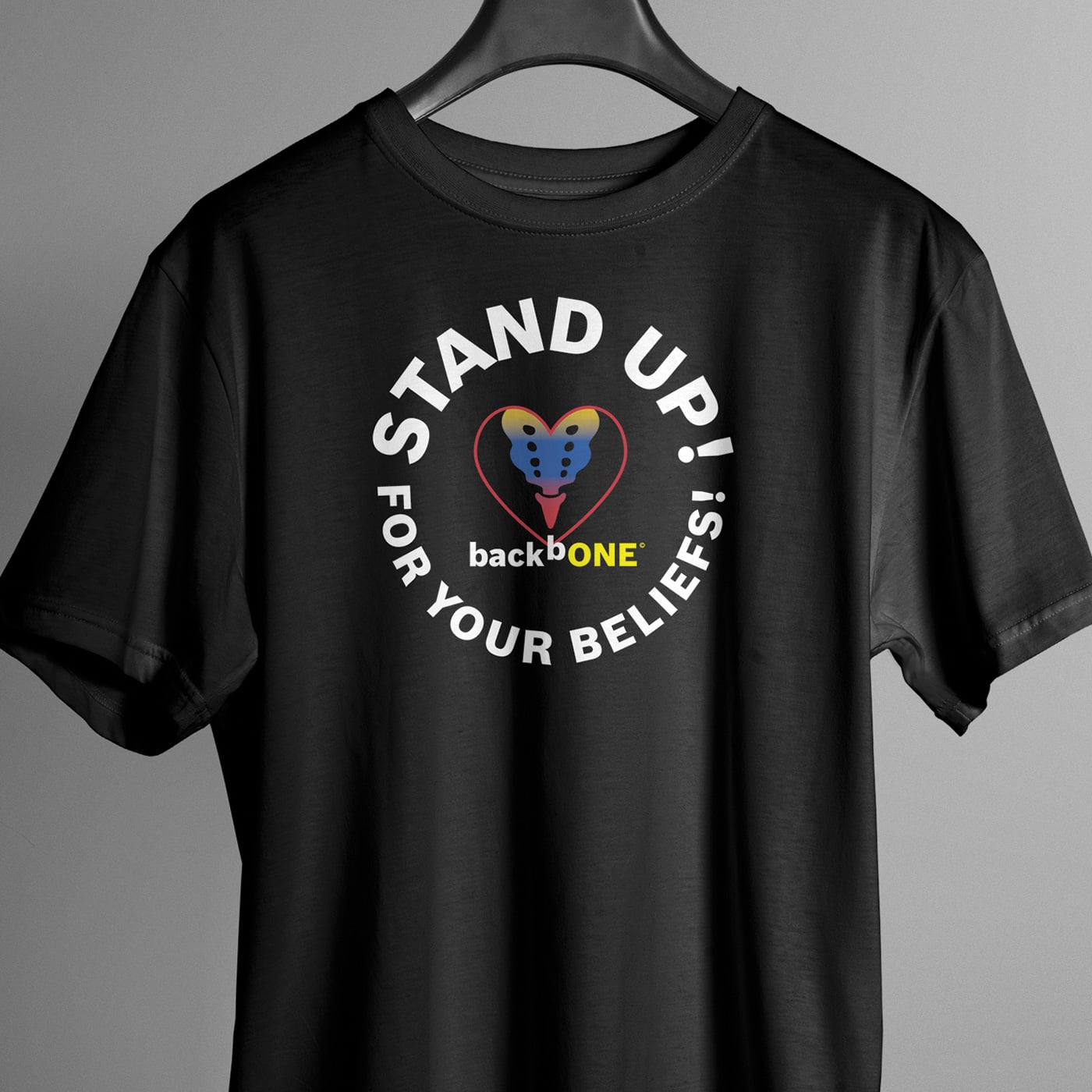Stand For Beliefs: A Comprehensive Guide To Upholding Your Values
Standing for beliefs is not just about voicing your opinions; it’s about living authentically and making choices that align with your core values. In a world that often pressures us to conform, staying true to your beliefs can be challenging yet incredibly rewarding. When you stand firm in your convictions, you create a life that feels purposeful and meaningful.
This article explores the importance of standing for beliefs, how to identify your core values, and practical steps to live authentically. Whether you're navigating personal relationships, career decisions, or societal challenges, this guide will equip you with the tools and knowledge to stay true to yourself.
As we delve into the topic, we will examine the psychological, social, and philosophical aspects of standing for beliefs. By the end of this article, you will have a deeper understanding of why upholding your values is essential and how to do it effectively in various areas of life.
Read also:Nickelback Vip Packages An Unforgettable Experience For True Fans
Table of Contents
- Understanding What It Means to Stand for Beliefs
- The Importance of Standing for Beliefs
- Identifying Your Core Beliefs
- Practical Steps to Stand for Beliefs
- Overcoming Challenges When Standing for Beliefs
- Psychological Benefits of Standing for Beliefs
- Social Impact of Standing for Beliefs
- Philosophical Perspectives on Standing for Beliefs
- Real-Life Examples of Standing for Beliefs
- Conclusion and Call to Action
Understanding What It Means to Stand for Beliefs
Standing for beliefs goes beyond simply agreeing with certain ideas or ideologies. It involves actively defending and promoting the values and principles you hold dear. This concept is deeply rooted in self-awareness and authenticity. When you stand for beliefs, you demonstrate integrity by aligning your actions with your inner convictions.
Why Standing for Beliefs Matters
In today’s fast-paced world, it’s easy to lose sight of what truly matters. However, standing for beliefs helps you maintain focus on your core values. This practice fosters resilience and empowers you to navigate life’s complexities with confidence. By understanding the significance of standing for beliefs, you can build a life that reflects your true self.
The Importance of Standing for Beliefs
Standing for beliefs is crucial for personal growth and societal progress. When individuals commit to their values, they inspire others to do the same. This collective effort can lead to positive change in communities and beyond. Moreover, standing for beliefs enhances emotional well-being by reducing cognitive dissonance and promoting inner peace.
Long-Term Benefits of Standing for Beliefs
- Increased self-confidence and self-esteem
- Stronger relationships built on mutual respect
- Greater influence in shaping the world around you
- Improved mental health through consistency in values and actions
Identifying Your Core Beliefs
To effectively stand for beliefs, you must first identify what those beliefs are. Core beliefs are the foundational principles that guide your decisions and actions. They often stem from personal experiences, cultural influences, and philosophical teachings. Understanding your core beliefs requires introspection and self-reflection.
Steps to Identify Your Core Beliefs
- Reflect on significant life experiences that shaped your values
- Consider the principles you consistently prioritize in daily life
- Explore philosophical and spiritual teachings that resonate with you
- Seek feedback from trusted friends or mentors
Practical Steps to Stand for Beliefs
Once you’ve identified your core beliefs, the next step is to put them into practice. This involves making conscious choices that align with your values, even when it’s difficult. Below are some practical strategies to help you stand for beliefs effectively:
Actions to Take
- Communicate your beliefs clearly and respectfully
- Engage in activities that promote your values
- Surround yourself with like-minded individuals
- Stay informed about issues relevant to your beliefs
Overcoming Challenges When Standing for Beliefs
Standing for beliefs is not without its challenges. You may encounter resistance from others, face societal pressures, or experience internal conflicts. However, these obstacles can be overcome with the right mindset and strategies. Building resilience and developing emotional intelligence are key to navigating these challenges successfully.
Read also:Unlock The Mysteries Of Astrology On December 15 Your Ultimate Guide
Common Challenges and Solutions
- Resistance from Others: Practice empathy and open-mindedness in your interactions.
- Societal Pressures: Focus on your personal goals rather than external expectations.
- Internal Conflicts: Seek guidance from trusted advisors or mental health professionals.
Psychological Benefits of Standing for Beliefs
From a psychological perspective, standing for beliefs has numerous benefits. It enhances self-awareness, boosts self-esteem, and reduces stress. When your actions align with your values, you experience a sense of congruence that contributes to overall well-being. Additionally, standing for beliefs can lead to increased motivation and purpose in life.
Research Supporting Psychological Benefits
According to a study published in the Journal of Personality and Social Psychology, individuals who live in alignment with their values report higher levels of life satisfaction and lower rates of depression. This research underscores the importance of standing for beliefs for mental health.
Social Impact of Standing for Beliefs
On a societal level, standing for beliefs can drive meaningful change. When individuals advocate for their values, they inspire others to do the same. This collective effort can lead to shifts in cultural norms and policies. For example, movements such as civil rights and environmental sustainability have gained momentum through individuals standing firm in their beliefs.
Examples of Social Change
- Civil rights activists who fought for equality
- Environmental advocates pushing for sustainable practices
- Community leaders promoting social justice
Philosophical Perspectives on Standing for Beliefs
Philosophers throughout history have explored the concept of standing for beliefs. From Socrates’ emphasis on truth and virtue to existentialists like Jean-Paul Sartre, who championed individual freedom, these thinkers provide valuable insights into the importance of authenticity. By examining these perspectives, we can gain a deeper understanding of why standing for beliefs is essential.
Key Philosophical Ideas
- Socratic philosophy: Emphasizing truth and moral integrity
- Existentialism: Highlighting personal responsibility and freedom
- Utilitarianism: Focusing on the greatest good for the greatest number
Real-Life Examples of Standing for Beliefs
Throughout history, there have been countless examples of individuals who stood for their beliefs, often in the face of adversity. These stories serve as powerful reminders of the impact one person can have when they remain true to their values. Below are a few notable examples:
Notable Figures Who Stood for Beliefs
- Mahatma Gandhi: Advocated for nonviolent resistance and independence
- Martin Luther King Jr.: Led the fight for civil rights and racial equality
- Rosa Parks: Refused to give up her seat, sparking a movement for justice
Conclusion and Call to Action
Standing for beliefs is a powerful way to live authentically and make a positive impact on the world. By identifying your core values, taking practical steps to uphold them, and overcoming challenges, you can create a life that reflects your true self. Remember, standing for beliefs is not just about personal growth; it’s about contributing to a better society.
We invite you to take action by reflecting on your own beliefs and committing to live in alignment with them. Share this article with others who may benefit from its insights, and explore more resources on our website to deepen your understanding. Together, we can build a world where standing for beliefs is celebrated and encouraged.

